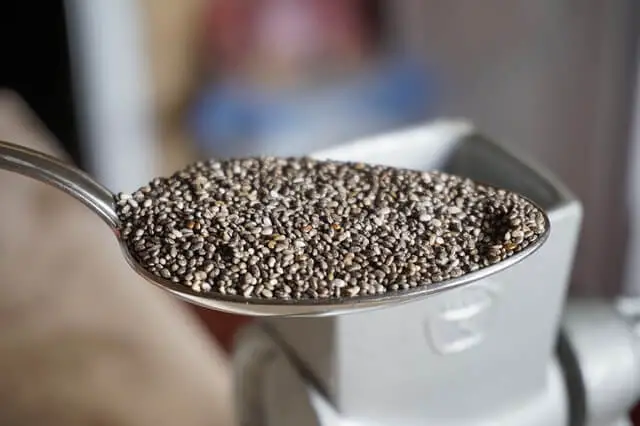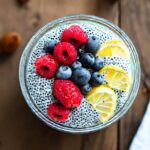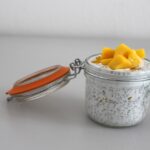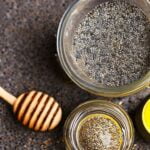Can chia seeds be a good option for those with IBS? In this post, we will explore that question, and look at other ways to find relief for IBS, including by adding chia seeds to the diet.
- What are Chia Seeds?
- What is IBS?
- Are Chia Seeds Good for IBS?
- How to Use Chia Seeds for Diarrhea or IBS
- Other Ways to Improve IBS
- Ten Worst Foods for IBS
- Are Chia Seeds Good to Use for Diahrrea?
What are Chia Seeds?
Chia seeds are a type of seed that is high in nutrients and has been linked to a number of health benefits. They are a good source of fiber, protein, and omega-3 fatty acids, and they are also rich in antioxidants and other nutrients. Chia seeds have a mild, nutty flavor and can be easily added to a variety of foods and beverages.
What is IBS?
Irritable bowel syndrome (IBS) is a common gastrointestinal disorder that affects the large intestine (colon). It is a chronic condition that can cause symptoms such as abdominal pain, bloating, gas, diarrhea, and constipation. These symptoms can vary in severity and may come and go over time.
Are Chia Seeds Good for IBS?
Some people with irritable bowel syndrome (IBS) or other digestive disorders may find that including chia seeds in their diet helps to alleviate their symptoms. Some also find that chia seeds are good for their digestive system.
Chia seeds are high in fiber, with about 10 grams of fiber per ounce (28 grams). This makes them a good option for those looking to increase their fiber intake, as fiber is important for maintaining regular bowel movements and may help to reduce the risk of constipation, diverticulitis, and certain types of cancer.

However, it is important to note that chia seeds may cause digestive symptoms in some people, especially if they are not used to consuming a lot of fiber. It is generally recommended to start with small servings of chia seeds and gradually increase the amount to allow the digestive system to adjust.
Additionally, chia seeds are considered low FODMAP in servings of up to 2 tablespoons (30 grams) per serving, according to Monash University’s FODMAP Diet App. This means that they can be safely included in a low FODMAP diet in this serving size. A low FODMAP diet is often recommended for people with IBS or other digestive disorders as it can help to manage their symptoms. (Learn more at Are Chia Seeds Low FODMAP?)
It is important to speak with a healthcare provider or a registered dietitian before making any changes to your diet, and to work with them to determine the appropriate dietary changes for your individual needs. They can help ensure that you are meeting your nutritional needs and can provide guidance on the appropriate serving size of chia seeds for you.
How to Use Chia Seeds for Diarrhea or IBS
To use chia seeds for diarrhea or IBS, you can try adding them to your diet in the following ways:
- Mix a teaspoon of chia seeds into a glass of water or a smoothie and drink it.
- Mix a teaspoon of chia seeds into your yogurt or oatmeal.
- Add a teaspoon of chia seeds to your salads or sandwiches.
- Use chia seeds as a thickener in soups or sauces.
- Sprinkle a teaspoon of chia seeds over your favorite dishes, such as roasted vegetables or grains.
You can find more ways to use chia seeds at How to Eat Chia Seeds.
Other Ways to Improve IBS
In addition to including chia seeds in your diet, there are a number of other dietary and lifestyle changes that may help to alleviate symptoms of IBS. These may include:
- Reducing stress: Stress can worsen symptoms of IBS, so it is important to find ways to manage stress, such as through relaxation techniques, regular exercise, or counseling.
- Limiting caffeine and alcohol: These substances can stimulate the digestive system and worsen symptoms of IBS.
- Eating smaller, more frequent meals: Large meals can put a strain on the digestive system and may worsen symptoms of IBS. Eating smaller, more frequent meals can help to reduce the workload on the digestive system.
- Avoiding trigger foods: Some people with IBS find that certain foods, such as high FODMAP foods, dairy products, or spicy foods, can worsen their symptoms. Identifying and avoiding trigger foods can help to manage symptoms of IBS.
- Staying hydrated: Drinking enough fluids can help to keep the digestive system functioning properly and may help to reduce the risk of constipation.
Overall, a healthy diet that is rich in fruits, vegetables, whole grains, and other plant-based foods is likely to be beneficial for those with IBS or other digestive disorders. It is important to speak with a healthcare provider or a registered dietitian to determine the best dietary approach.
Ten Worst Foods for IBS
Some people with IBS find that certain foods can worsen their symptoms, while others may be well-tolerated. Here are 10 foods that may be considered the “worst” for people with IBS:
- High FODMAP foods: FODMAPs are short-chain carbohydrates that can be poorly absorbed in the small intestine, leading to symptoms of IBS. High FODMAP foods include certain fruits, vegetables, grains, and dairy products.
- Spicy foods: Spicy foods can irritate the digestive system and worsen symptoms of IBS.
- Fried foods: Fried foods are high in fat and can be difficult to digest, leading to symptoms of IBS.
- Processed and packaged foods: These types of foods may contain additives and preservatives that can irritate the digestive system and worsen symptoms of IBS.
- High-fat meats: Meats that are high in fat, such as bacon and sausage, can be difficult to digest and may worsen symptoms of IBS.
- Alcohol: Alcohol can stimulate the digestive system and worsen symptoms of IBS.
- Caffeinated beverages: Caffeine can stimulate the digestive system and worsen symptoms of IBS.
- Carbonated beverages: Carbonated beverages can cause bloating and gas, which can worsen symptoms of IBS.
- Artificial sweeteners: Some artificial sweeteners, such as sorbitol and mannitol, are considered high FODMAP and may worsen symptoms of IBS.
- Beans: Beans are high in fiber and may cause bloating and gas, which can worsen symptoms of IBS.
It is important to note that these are just a few examples of foods that may be problematic for people with IBS. Individual tolerance to different foods may vary.
Are Chia Seeds Good to Use for Diahrrea?
Some people with diarrhea may find that including chia seeds in their diet helps to alleviate their symptoms.
Lance has been passionate about the plant-based diet and we have been following a whole food plant-based diet for over 5 years. We focus on health, natural healing, weight management, animal rights, and the health of the planet and environment by focusing on whole plant-based foods and sustainable practices.
Learn more at the About Me page and follow on social media at the links below.




